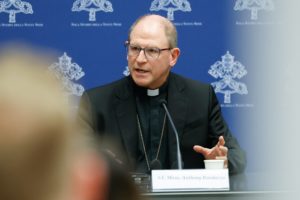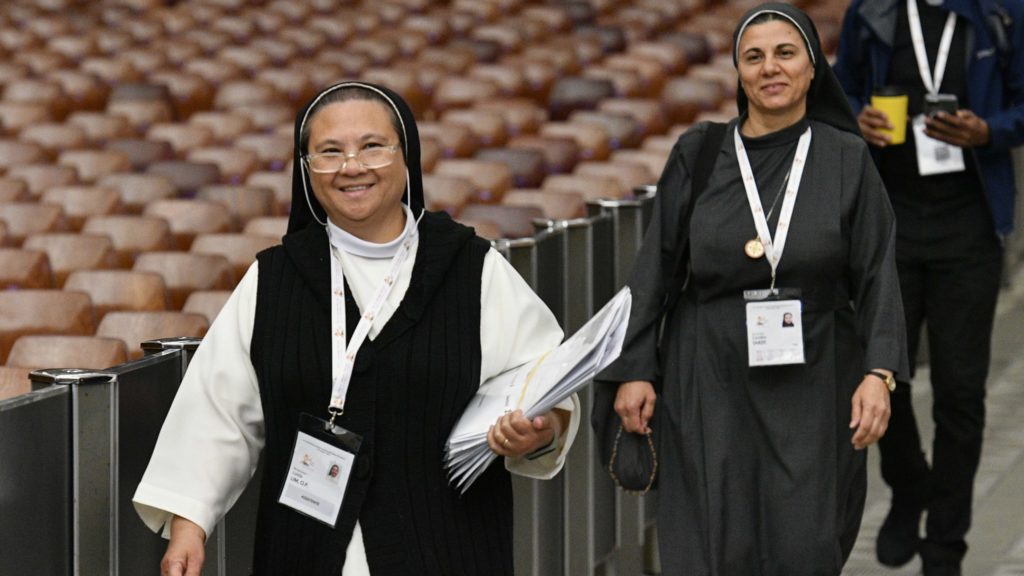ROME – Participants in the Synod of Bishops on Synodality selected by organizers to speak with the media have said Pope Francis’s comments on women priests and blessings for same-sex couples prior to the gathering eliminated the distraction of getting hung up on specific issues, thereby creating space for other topics to be addressed.
The pope’s spokesperson for the synod, Italian layman Paolo Ruffini, head of the Vatican’s Dicastery for Communication, also stressed that the synod is not a “talk show” in which participants respond to queries from the press but is rather a “spiritual conversation” aimed at discerning God’s will.
Days before the synod, the Vatican published Pope Francis’s responses to five dubia, or doubts, presented by five conservative cardinals who are not participating in the assembly, and which focused on women’s ordination, the blessing of same-sex unions and the authority of the synod to issue binding teaching.
In his responses, published Oct. 2, two days before the synod began Oct. 4, Francis upheld the church’s ban on women priests, but said the issue could still be studied, while he cautiously approved blessings for same-sex couples on a case-by-case basis, so long as doing so does not lead to confusion regarding the church’s sacrament of marriage.
In the wake of those statements, some observers complained that Pope Francis had impeded the synod’s discussion and discernment process, as those were two key issues expected to be addressed during the month-long gathering.
Yet when panelists at an Oct. 18 synod news briefing were asked if they were glad Pope Francis had issued those instructions, or whether they would have preferred for the issues to remain open-ended going in, they said they were pleased.
Australian laywoman Reneé Ryan, a professor of theology and philosophy at the University of Notre Dame in Australia, said, “It’s always good to know, always good to get a bit of a lead on what the Holy Father would like to guide us in as our spiritual leader.”
Regarding the question of women’s priestly ordination, Ryan said “as a woman, I’m not focused on the fact that I’m not a priest. I think that there’s too much emphasis placed on this question and what happens when we place too much emphasis on this question is that we forget about what women, for the most part, need in the world.”
Most women, she said, are focused on the needs of their family the practical realities of everyday life, and are not caught up in internal church debates.
“Some people are very focused on this idea that only if women become ordained will they have any kind of equality, but we’re not looking at equality as a one-for-one thing in the Church,” she said, saying, “we can become too distracted by this particular issue and what that does is it detracts from all of the other things that we could be doing.”
Other areas of focus, she said, are finding ways to ensure that professional women are not forced to choose between family and career, and that families receive the support they need amid various economic pressures.
“I think that’s a far more interesting conversation for most women than what I tend to think of as a fairly niche issue,” she said.
Bishop Anthony Randazzo of Broken Bay, Australia, said there is a history of popes receiving questions prior to large ecclesial gatherings, and pointed to the question of priestly celibacy at the time of the 1962-65 Second Vatican Council.
Paul VI, who penned the 1967 encyclical Sacerdotalis caelibatus on the topic, at the time of the council “intervened directly and reserved the question for himself, not to say you can’t speak about it, but so it could undergo a more broad conversation, a more profound study, then later on produced something that is an ongoing reference point for formation and discussion to this day,” Randazzo said.
Regarding Pope Francis’s decisions, Randazzo said, “I think it’s a good thing that the Holy Father took the lead to be able to respond, and he’s good at that.”
“He has a real charism in being able to speak to issues that are real for people by listening to them, not dismissing them, and allowing them to sit where they are so that they come to a maturity, maybe not at the moment, but as things grow a little further,” he said.

Nigerian Father Agbonkhianmeghe Emmanuel Orobator, president of the Jesuit Conference of Africa and Madagascar and former Jesuit provincial for Africa, also weighed in, insisting that the synod is merely a consultative body, and thus “it doesn’t make decisions.”
He said the process is more important than whatever decisions are made, and that in the process, “if we’re not distracted by concentrating on niche issues, but allowing ourselves to build a process, a framework that actually works, it becomes possible for us to address these issues in a way that is constructive and not confrontational.”
Asked about women deacons, Ryan said there are still “question marks,” and that as a synod body, “what we’re identifying at the moment is whether there needs to be more theological consideration of different issues, and I think I can safely say this is one that needs more consideration given that this is an issue that has been looked at before.”
According to synod organizers, issues addressed in the synod discussion during Monday’s afternoon session and Tuesday’s morning session also included clericalism as an obstacle to communion; potential changes to canon law; co-responsibility between laity and Church hierarchy; the relationship between leadership and service; priest shortages, and the need to not “clericalize” laity.
Discussion also touched on the role of bishops in promoting ecumenical and interfaith dialogue; the possibility of more consultation in the selection process for bishops; and the need for bishops to understand that they are not alone and cannot do everything by themselves, especially when it comes to financial matters.
Ongoing formation of bishops, priests, religious and laity was also mentioned, especially for so-called “baby bishops” recently appointed, and mention was also made of the need for bishops to listen to abuse victims.
The role of women was also discussed, with synod organizers referring to calls for a “new spiritual intelligence” in the Church, as well as the women’s diaconate, and proposals for women to give homilies, based on the fact that they were the first to proclaim Jesus’s resurrection.
Participants noted that Oct. 17 marked the special day of prayer and fasting for the Holy Land requested by Pope Francis given the outbreak of war between Israel and Hamas.
It was also noted that Cardinal Blase Cupich of Chicago left the synod and returned home following the unexpected death of his auxiliary bishop Kevin Birmingham.
Asked whether there were differences in priorities between participants from developed versus developing nations, Spanish Cardinal Cristóbal López Romero, Archbishop of Rabat, Morocco, said differences exist, but they are not “clear cut” and do not amount to “clashes.”
“There are no conflicts, so the method of a conversation in the spirit makes sure there is basic respect among all of us…each one says what in their conscience they feel they need to…but we do not speak in response to what the others have said, so there are no clashes, clashes you typically seen in a political parliament,” he said.
While differences exist, “quite honestly, it’s more what unites us than what separates us,” he said.
In response to a question on whether synod participants are aware of the primary areas of interest for the media and whether those areas of interest align with what participants see as priorities, Ruffini said that while there is a media blackout, “we’re not closed,” and synod members are aware of what’s in the news.
“The synod is not thought of to respond to the questions of journalists, it’s a discernment of the Church born of…a long process of listening to the entire Church in the whole world, and from there are born the conversations we are having,” he said.
Asked whether hot-button issues in the synod’s working document such as the status of women and the welcome of the LGBTQ+ community are being taken seriously, Ruffini said yes, and that impressions that there will be no results at the end of the synod are “inexact and false.”
“We have said repeatedly that we are in the middle of a path and that the synod will end, this assembly, with a synthesis document and it will be sent back to the people of God and then there will be another assembly,” he said.
Referring to the round tables that participants are seated at during synod sessions, a visibly irritated Ruffini said that to speak of the round table “as if it’s a talk show is exactly the opposite” of what is happening.
“It’s not a roundtable, it’s a conversation in the spirit that’s trying to make a discernment to respond to what was requested by the people of God,” he said.
Orobator said issues of key interest such as the status of women and the welcome of LGBTQ+ Catholics are being discussed “seriously and passionately” in the synod hall and are not being ignored.

